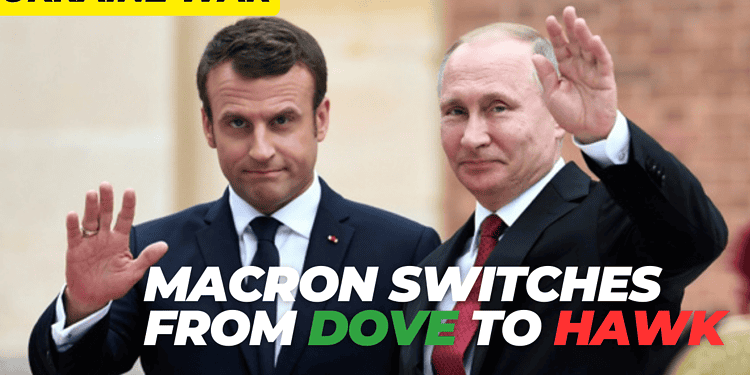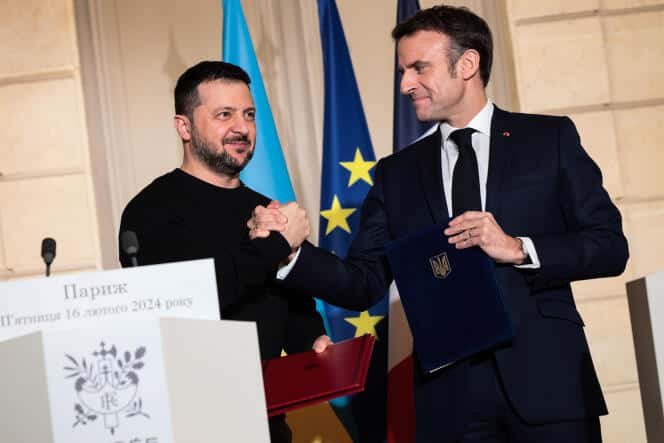The transformation of French President Emmanuel Macron’s stance towards Russia and Ukraine has raised eyebrows across Europe, shifting from a more conciliatory approach to one that is increasingly assertive. This change prompts inquiries into the motivations behind his newfound assertiveness as the leading figure in Europe’s resistance against Vladimir Putin.
Countries such as the Baltic states and Poland have expressed approval of President Macron’s shift towards what they view as a more accurate perception of the threat posed by Moscow. However, this stance has surprised and concerned other nations, particularly Germany under Chancellor Olaf Scholz, who are wary of France’s aggressive posture.
The sincerity of President Macron’s revised policy towards Ukraine, including his openness to the possibility of deploying troops, is subject to speculation. Observers are questioning whether this shift is a strategic move to enhance his diplomatic profile or if it is influenced by domestic political calculations.
With European elections on the horizon, and the right-wing factions led by Marine Le Pen and Jordan Bardella poised for significant gains, there is speculation that Macron is leveraging the situation in Ukraine to delineate a clear ideological divide between his administration and the opposition. This strategy could be aimed at contrasting his own decisive stance against what is perceived as Le Pen’s historically murky relationship with Moscow.
During a televised interview in France, President Emmanuel Macron tacitly recognized the critical scrutiny his pivot in foreign policy has attracted. In characteristic fashion, Macron chose to assert rather than appease, offering an explanation for his shift from a pacifistic to a more hawkish stance. He articulated that this transformation was necessary, positing that one must exhaust all diplomatic avenues before declaring an adversary irreconcilable.
Macron further justified his position by highlighting an escalation in Russian aggression. He cited Russia’s hardening stance, including putting its economy on a war footing, increasing repression against internal dissent, and intensifying cyber-attacks against France and other nations. With Ukraine’s situation worsening and the reliability of the United States as an ally in question, Macron emphasized that Europe is entering an era where previously unthinkable scenarios are unfolding.
He introduced what could be called the “Macron doctrine,” advocating for Europe to prepare for war in order to maintain peace. This doctrine calls for a mental shift from the comfort of past certainties to the stark realities of the present. Macron’s rhetoric, evocative of Churchill’s, underlines his belief in the necessity of readiness for conflict to ensure peace.
However, Macron’s intellectual and logical approach raises questions about his ability to not just convince but persuade others to follow his lead, particularly given the challenges of translating his intellectual prowess into effective leadership.
The tension between France and Germany exemplifies the difficulties Macron faces. Despite efforts to present a united front, significant disagreements remain, with France criticizing Germany’s hesitance in supporting Ukraine and Germany accusing France of hazardous aggression and insincerity in its support.
Domestically, Macron’s stance on Ukraine does not enjoy widespread support, with a significant portion of the French population opposed to the idea of deploying Western troops to Ukraine. Public support for the Ukrainian cause has been waning, and Macron’s attempt to politically marginalize the far-right by highlighting their ambivalence towards Moscow has not diminished their growing popularity.
In championing a more assertive European stance on security, Macron is indeed breaking new ground and challenging Europeans to reconsider their security needs and the potential sacrifices required. While his leadership in this regard may be seen as necessary and even commendable, it also reveals a disconnect with public sentiment, where his self-assurance and perceived prioritization of French or personal interests over broader European or global concerns draw criticism. This discord underscores the intricate balance Macron must navigate between asserting a bold vision for Europe and cultivating the leadership necessary to unite and lead the continent forward.
















































